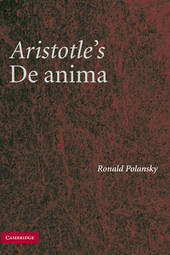
|
Aristotle's De Anima: A Critical Commentary
Hardback
Main Details
| Title |
Aristotle's De Anima: A Critical Commentary
|
| Authors and Contributors |
By (author) Ronald Polansky
|
| Physical Properties |
| Format:Hardback | | Pages:598 | | Dimensions(mm): Height 229,Width 152 |
|
| Category/Genre | Western philosophy - Ancient to c 500 |
|---|
| ISBN/Barcode |
9780521862745
|
| Classifications | Dewey:128 |
|---|
| Audience | | Professional & Vocational | |
|---|
|
Publishing Details |
| Publisher |
Cambridge University Press
|
| Imprint |
Cambridge University Press
|
| Publication Date |
24 September 2007 |
| Publication Country |
United Kingdom
|
Description
Aristotle's De Anima is the first systematic philosophical account of the soul, which serves to explain the functioning of all mortal living things. In his commentary, Ronald Polansky argues that the work is far more structured and systematic than previously supposed. He contends that Aristotle seeks a comprehensive understanding of the soul and its faculties. By closely tracing the unfolding of the many-layered argumentation and the way Aristotle fits his inquiry meticulously within his scheme of the sciences, Polansky answers questions relating to the general definition of soul and the treatment of each of the soul's principal capacities: nutrition, sense perception, phantasia, intellect, and locomotion. The commentary sheds light on every section of the De Anima and the work as a unit. It offers a challenge to earlier and current interpretations of the relevance and meaning of Aristotle's highly influential treatise.
Author Biography
Ronald Polansky is professor of philosophy at Duquesne University. Editor of the journal Ancient Philosophy since founding it in 1979, he is the author of Philosophy and Knowledge: A Commentary on Plato's Theaetetus, and co-editor of Bioethics: Ancient Themes in Contemporary Issues.
Reviews'Reading Polansky's commentary is a satisfying venture, regardless of whether or not one agrees with the author's insights. His careful arguments, the richness of his secondary sources, and his pedagogical style invite thought and further research. Polansky's commentary will remain a necessary book to be consulted by the researcher of the De Anima.' Bryn Mawr Classical Review
|